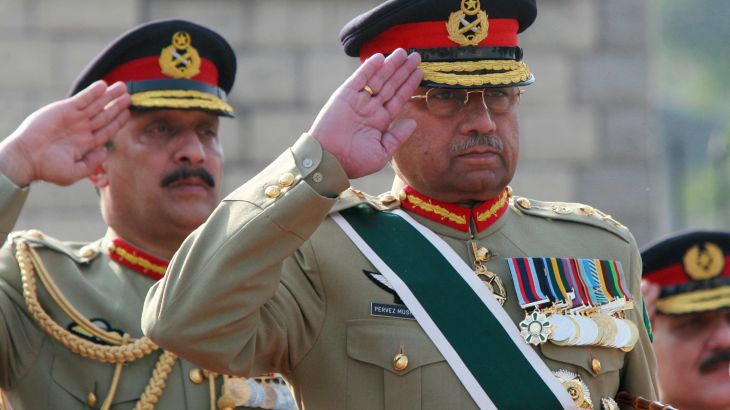Pervez Musharraf, ex-military ruler of Pakistan, laid to rest
Pervez Musharraf, who backed the US invasion of Afghanistan, was buried at a cemetery in Karachi with ‘military honours’.

Islamabad, Pakistan – Former Pakistani military ruler Pervez Musharraf, who backed the United States’ invasion of Afghanistan following the 9/11 attacks, has been buried at a cemetery in the southern city of Karachi with “full military honours”.
Musharraf died of prolonged illness on Sunday at age 79 in Dubai, where he had been living since 2016. He was suffering from amyloidosis, a rare disease that causes organ damage.
Keep reading
list of 4 itemsPakistani former President Pervez Musharraf dies aged 79
Family: Former Pakistan military ruler Musharraf gravely ill
Ex-military ruler Pervez Musharraf’s body brought to Pakistan
Tahir Hussain, a spokesperson for Musharraf’s political party All Pakistan Muslim League (APML), said the former president’s funeral was attended by former army chiefs, senior military officials, and political figures.
“Recently retired army chief General Qamar Javed Bajwa, former chiefs [Mirza] Aslam Beg, Ashfaq Parvez Kayani, as well as former chief of Inter-Services Intelligence General [Ahmad] Shuja Pasha were all in attendance in the funeral prayer,” Hussain told Al Jazeera.
Hussain said that an estimated 3,000-4,000 people attended the funeral prayers at the Malir military cantonment despite strict security. Musharraf’s body was then taken to the army graveyard 20km (12 miles) to the southwest for burial.
Ishaq Khan Khakwani, a former state minister under Musharraf’s rule, who also attended the funeral, said people belonging to all walks of life were present.

Joined so-called ‘war on terror’
Musharraf’s body was brought back to Pakistan on Monday night on a special flight, accompanied by his wife Sehba, and his two children Bilal and Ayla.
Musharraf was handpicked by then-Prime Minister Nawaz Sharif as chief of Pakistan’s army in 1998. But he seized power a year later in a bloodless coup after Sharif tried to remove him as the army chief.
Under Musharraf’s tenure, Pakistan became a key US ally and joined its so-called “war on terror” after the deadly attacks on September 11, 2001.
The former military ruler’s nine-year tenure is remembered for gross human rights violations in the South Asian country. He also allowed the US to carry out air raids in Pakistan’s tribal regions bordering Afghanistan.
He resigned as the army chief in 2007 to become president. The same year, Musharraf imposed a state of emergency in the country to suppress massive, nationwide protests against his rule.
In December of 2007, one of his main critics, former Prime Minister Benazir Bhutto, was assassinated in an attack in the city of Rawalpindi during an election rally. The family of the slain leader accused the general of being behind the killing, which Musharraf denied.
In the general elections held in February 2008, Bhutto’s Pakistan People’s Party emerged victorious. Faced with a threat of impeachment, Musharraf subsequently resigned as the president and eventually left the country for Dubai.
He divided his time between London and Dubai during his self-exile.
Treason trial
In 2010, Musharraf founded the All Pakistan Muslim League political party, but suffered a humiliating defeat in the 2013 general elections. Sharif, whom Musharraf had deposed in 1999, came back to power. Musharraf himself was disqualified a month before the 2013 polls.
Sharif’s government initiated a treason trial against Musharraf for suspending the country’s constitution twice during his rule.
In December 2019, a special court found him guilty in absentia of high treason and subverting the constitution and sentenced him to death.
The director of the Pakistan Initiative at the Atlantic Council’s South Asia Center, Uzair Younus, said that while the former general has passed away, “the long and dark shadow of his reign continues to haunt Pakistan”.
“While some, such as citizens of Karachi, still fondly remember him for the development they saw during his era, when these benefits are weighed against the costs incurred by generations of Pakistanis during and after his dictatorship, it is quite clear that generations of Pakistanis lost out due to the choices that Musharraf made,” Younus told Al Jazeera.